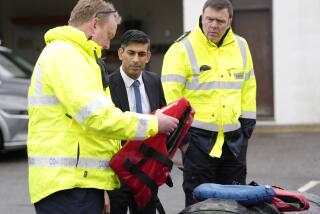Blair Moves to Isolate, Expel Extremists
- Share via
LONDON — With his nation shaken by last month’s bombings, British Prime Minister Tony Blair on Friday announced tough anti-terrorism measures that include shutting down radical mosques and deporting Islamic clerics who preach violence and hatred.
The plan is aimed at isolating religious extremists while giving wider powers to counter-terrorism forces in a country increasingly unnerved by militants. The proposals are an indication that the recent attacks on London’s transit system, the first of which killed 52 people, have caused the government to reexamine the line between civil rights and national security.
“Let no one be in any doubt, the rules of the game are changing,” Blair said during a 90-minute news conference.
In many ways, the measures run counter to Britons’ long-held view of their nation as one of the most open and multicultural in the world. The bombings, combined with mounting fear of global terrorism and jihadist rhetoric from fringe Islamic organizations, appear to have provided a political mandate for changes that only a few years ago would have been nearly impossible.
The prime minister’s objective is to rid the country of foreign Islamic militants and crush any extremist elements that remain. Blair said the government was working on agreements with other nations to guarantee that anyone Britain sent back to the Middle East and Africa would not be tortured or abused.
But emphasizing his determination to toughen anti-terrorism regulations, Blair said he would seek to amend human rights legislation if the courts didn’t support his proposals for deportation and banning certain political parties.
Human rights groups and liberal members of Blair’s Labor Party immediately criticized the measures, which also call for making it a crime to “glorify” terrorism and for cracking down on websites and bookshops that distribute militant writings.
Critics said the plan would violate free speech and other civil rights.
“We don’t win by mimicking the profound authoritarianism of those who are plotting against this country,” said Shami Chakrabarti, director of the human rights group Liberty. “I think it is very worrying that the prime minister has jeopardized our national unity today both in terms of community relations and in terms of consensus politics.”
Liberal Democrat leader Charles Kennedy said Blair’s 12-point plan, much of which requires parliamentary approval, risked “inflaming tensions and alienating people.”
London Mayor Ken Livingstone said he supported tougher laws but added that Blair’s plan was “so vague that 20 years ago it would have meant banning Nelson Mandela or anyone supporting him.”
Conservatives largely embraced the proposals as a crucial shift in tone from a government they have viewed as too lenient on immigrants and foreign agitators. The plan is forcing Britain to reflect on how far to extend police powers, much as the U.S. did after the Sept. 11 attacks. The measures do not appear as sweeping as some imposed by the Bush administration, but they move Britain in a conservative direction in the area of civil liberties.
This nation has long prided itself on its multiculturalism, but after the July 7 bombings and the July 21 attempted repeat bombings, Blair’s plan seems to have found resonance. Nevertheless, it is expected to be rigorously debated in Parliament by liberal politicians who unsuccessfully opposed anti-terrorist legislation in 2002.
“Coming to Britain is not a right,” Blair said. “And even when people have come here, staying here carries with it a duty. That duty is to share and support the values that sustain the British way of life. Those that break that duty and try to incite hatred or engage in violence against our country and its people have no place here.”
Britain and the rest of Europe have long been frustrated by imams coming from the Middle East and preaching hatred of the West in neighborhood mosques. Clerics such as Egyptian-born Abu Hamza al Masri, who lives in Britain but faces possible extradition to the U.S. on suspicion of terrorism-related crimes, have been blamed for inciting young, frustrated Muslim men.
The suspects in the July 21 bombing attempts are believed to be British citizens of Islamic African descent who may have been radicalized by foreigners in Britain.
Blair called for banning the British offices of the group Hizb ut-Tahrir, which has called for Europe to be ruled by Islamic law.
“There will be serious repercussions in terms of community relations if this ban goes ahead,” said Imran Waheed, a spokesman for Hizb ut-Tahrir in Britain. “Our members are all for political expression, not for violence.”
Blair announced the plan as he fends off criticism over his foreign policy, especially the war in Iraq, which most Britons opposed. Islamic radicals, including Al Qaeda lieutenant Ayman Zawahiri in a video aired Thursday, have said terrorist attacks on Britain would continue because of Blair’s support for U.S. efforts in Iraq, Afghanistan and the Middle East.
Blair said his counter-terrorism plan would deny Al Qaeda and other extremist organizations haven in Britain. However, he acknowledged the sensitivities it aroused and the political fight to come.
“Such action in the past has been controversial,” Blair said. “Each tightening of the law has met fierce opposition. But, for obvious reasons, the mood is now different.”
More to Read
Sign up for Essential California
The most important California stories and recommendations in your inbox every morning.
You may occasionally receive promotional content from the Los Angeles Times.











